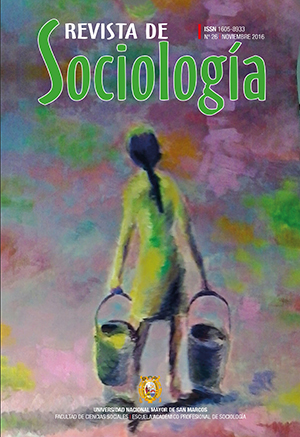Bagua y el Perú: extractivismo, dominación patriarcal y comunalidad
DOI:
https://doi.org/10.15381/rsoc.v0i26.18986Palabras clave:
Bagua, extractivismo, patriarcado, conflicto indígena, naturaleza, capital y trabajo, teoría clásica, teorías latinoamericanasResumen
Reflexionar en torno a los códigos, las relaciones sociales y afectivas que emergen de la enunciación discursiva y los actos de las y los actores sociales que participaron en el conflicto socioambiental ocurrido en Bagua el 5 de junio de 2009, en diálogo con la teoría social clásica y la teoría de la colonialidad del poder, en primer lugar nos permite comprender otra visión del mundo y de la vida desde la perspectiva de ser “indígena” y habitante de la Amazonía en Perú; en segundo, que todo el proceso previo forma parte de las estrategias de recolonización de los territorios de nuestra América, en particular de la Amazonía y al mismo tiempo constituye un punto de inflexión, de cuestionamiento al modelo de desarrollo impuesto. A diferencia de la concentración autoritaria de poder que irradia del gobierno y del “Estado Nación”, las comunidades dan lecciones de una democracia de mayor intensidad y revelan las contradicciones entre la existencia social comunitaria y el “estado nación” que representa a las corporaciones y al patrón global de poder.
Descargas
Publicado
Número
Sección
Licencia
Derechos de autor 2018 Carolina Ortiz Fernández

Esta obra está bajo una licencia internacional Creative Commons Atribución-NoComercial-CompartirIgual 4.0.
LOS AUTORES RETIENEN SUS DERECHOS:
a. Los autores retienen sus derechos de marca y patente, y también sobre cualquier proceso o procedimiento descrito en el artículo.
b. Los autores retienen el derecho de compartir, copiar, distribuir, ejecutar y comunicar públicamente el artículo publicado en la Revista Sociología (por ejemplo, colocarlo en un repositorio institucional o publicarlo en un libro), con un reconocimiento de su publicación inicial en la Revista Sociología.
c. Los autores retienen el derecho a hacer una posterior publicación de su trabajo, de utilizar el artículo o cualquier parte de aquel (por ejemplo: una compilación de sus trabajos, notas para conferencias, tesis, o para un libro), siempre que indiquen su publicación inicial en la Revista Sociología (autores del trabajo, revista, volumen, número y fecha).






